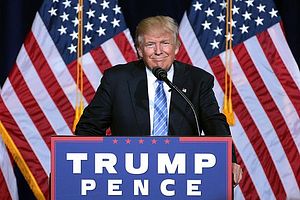Now that the reality of President-elect Donald Trump is settling in, questions — on policy, on preference, on temperament — continue to pile up. Given Trump’s history of blatantly contradictory policy prescriptions, the United States’ future moves present a raft of questions few incoming administrations have ever matched.
Despite the fact that the Republican Party’s platform, for the first time in American history, addressed Central Asia as a distinct entity, the region will almost certainly remain an afterthought for policymakers in Washington. Still, it’s worth parsing what a Trump administration may bring to U.S. regional policy and what regional governments can expect from the incoming U.S. leadership.
Given Trump’s, and the broader GOP’s, preferences for putative stability, there seems little likelihood the White House will lean on regional autocracies on behalf of those pushing democratization efforts. From Astana to Dushanbe, regional dictators will likely be given that much freer reign to clamp down on dissent, to jail and surveil, to expand both methods of refoulement and human rights abuses. Efforts at institutionalizing democratic norms across the region, already running on fumes, will see their support from the White House effectively extinguished even while the regional regimes grow increasingly brittle.
Meanwhile, based on Trump’s prior rhetoric and business acumen — or lack thereof — there stands an outsized possibility of the new White House poaching certain methods of regional kleptocracy. Given Central Asian governments’ roles in formulating methods of modern kleptocracy, Trump’s interest in the region may not stem from containing Russian expansionism or pushing investment in Afghanistan, but, rather, from the cadres of kleptocrats lining the ranks of regional governments. Inter-personal financial partnerships may well blossom and a trans-national network of elite predation may well expand that much further. At the least, Trump’s administration might pressure the U.S. Department of Justice to ease its Kleptocracy Asset Recovery Initiative, one of Washington’s most effective regional programs. (What happens with the frozen funds relating to Tashkent’s bribery remains, under Trump, an open guess.)
As to presidential-level relations, regional leaders — Kazakhstan’s Nursultan Nazarbayev and Uzbekistan’s Shavkat Mirziyoyev, most especially — will espy a kindred spirit in Trump, who has shown a distinctly anti-democratic streak regarding public protests and media coverage. Regional heads will likely overlook Trump’s anti-Muslim rhetoric, and instead seek to stoke his ego that much more to convince Trump to ease off any lingering human rights criticisms the United States may direct toward the region. And if the region should see a flare-up in the Fergana Valley, or if there should be a reprise of Andijan-style protests, the likelihood of a U.S. response, either as it pertains to rhetorical support or refugee intake, is suddenly negligible.
More broadly, the New Silk Road Initiative, already an afterthought, will be effectively forgotten. (It doesn’t help that the foremost diplomat likely slated for Trump’s Cabinet, former UN Ambassador John Bolton, doesn’t know how to pronounce “Kazakhstan.”) Retrenching from the region that much further, the United States will cede what little influence remains to Russia and China with an outside possibility of Trump’s administration lending weight to the latter’s Silk Road Economic Belt, if only because the financial underpinnings of the SREB are a bit more sound than, say, the Russia-led Eurasian Economic Union.
It’s also worth noting that the post-Cold War order — effectively predicated on American assurance of sovereign post-Soviet borders — seems to have come to a rapid close over the past few years, with Trump’s election making post-Soviet borders that much softer. And two years after Russian President Vladimir Putin dog-whistled his support for restive ethnic Russians in northern Kazakhstan, the likelihood of Moscow meddling in northern Kazakhstan — especially as a means of shoring up Putin’s domestic base, and especially if Nazarbayev ends his presidency during the Trump administration — has just taken a significant leap.
To be fair to Trump’s incoming administration, many of these trends, including American retrenchment and a willingness to overlook entrenching autocracy, took shape under the Obama administration. Trump’s election, however, effectively confirms a U.S. policy of neglect in the region, save for added mutual admiration of authoritarian tactics and kleptocratic expansion.

































